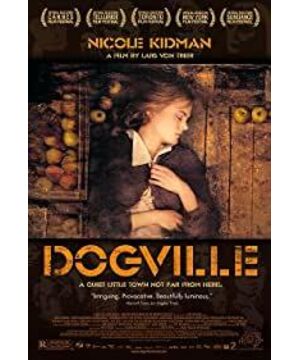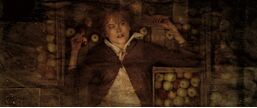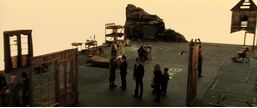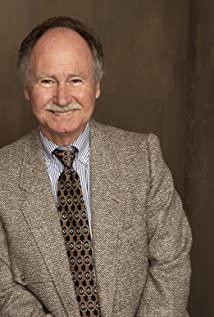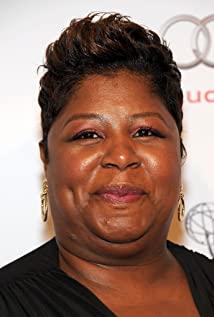This is a real horror movie.
The horror of it is that it is a sharp, shimmering questioning. Under this questioning, our self-righteous morality becomes weak and unpretentious: If you are a dog town, would you be violent to an innocent person? ? Moreover, if violence is democratized, allowed, safe, legitimate, and without worries, you can also get some satisfaction from it. The whole city is like this, no one is an exception, and you dare to be confident. Don't you say so?
After watching "Dogtown", I was in a trembling state for a long time, it was a real physical tremor, not a rhetoric. Without any explanation, it pushed me to the court of human nature, tortured my conscience, and judged my virtues, so that later, they all became untenable and became suspicious.
Will i? Do I dare to go against the tune of the whole town?
I can't be confident.
Maybe will? Maybe not? Or maybe I will just sit on the sidelines indifferently, do not follow evil deeds, nor violate my conscience, stay away from the collective, and protect myself wisely. However, silence is not another kind of recognition, and cold violence is not another form of violence.
1. The most heinous story in history
"I only saw a beautiful village in the high mountains. Faced with a difficult environment, everyone still has dreams and hopes. There are also seven little porcelain men who are not ugly at all."
Grace Before it appeared, the dog town we saw was a paradise. It is independent of the world, the land is flat, and the house is just like a fertile field and the genus of mulberry and bamboo. Under a certain customary law, people are cautious in their words and deeds, respect each other as guests, and at the same time work hard to cultivate, without any sidelines. The contradictions are as orderly as a computer program.
"They are all good people..."
"They are all good children..."
Their words outline a paradise of human nature-all are good people, all children are good children, kindness is here to dominate the world, and there is no harm in human nature. Looking everywhere, greed and evil have nowhere to stay.
However, are these farmers at the foot of the Rocky Mountain really so naive?
Quizzes always come suddenly.
As a cause of contradiction, Grace appeared. She arrived with the faint gunfire, breaking the balance and silence of Dogtown. This gunshot represented the people in Dogtown's understanding of her: a faint threat, an alien heresy. So when she walked into Dogtown and tried everything possible to blend in, their kindness had always been reserved.
After discussion, they decided to keep Grace in town for two weeks to see the after-effects. In order to please them, Grace went to every house to help with work, take care of the land, accompany the elderly, and teach the children... Two weeks later, they agreed to let the strange woman stay in the town.
Seeing this in the movie, I almost think that Grace will eventually mingle with this group, marry Tom, become a member of Dogtown, and from then on, live a happy life and have a fairy tale-like ending.
But Dogtown is a sphinx-like secret, the beauty of the beauty, the beast's body and mind, it is full of temptation, it makes people fall into, confused and fearful. Whoever untie it will die in embarrassment in front of those eyes; whoever is unable to see through will become the prey of the sphinx!
"Has Dogtown fooled you? This village is rotten from the inside out, even if it falls off the cliff, I am indifferent, I can't see its charm..."
Before the people in Dogtown abused Grace collectively, there was a person , Who is also from the city, has similar pursuits and backgrounds as Grace, but then the first person to rape her-Chuck-foretells the tragedy in advance.
He said: "You fall in love with Dogtown, the trees, mountains, and simple people. Otherwise, those cinnamon can fool you, the cinnamon in the gooseberry pie. Dogtown is fully in line with the dreams of urbanites..."
"You It’s also from the city, right?"
"That’s a long time ago. I'm not that stupid anymore. People are just as greedy. It's just that the country folks fail. Some eat them and break their belly..."
But Grace didn't believe it. This place where everyone is well-behaved, faithful, democratic, and hopeful will be a nose hell, especially after the 15 bells that agreed with her left, she feels that this is her utopia and the other side she yearns for. , Is a kind of paradise corresponding to her father's underworld, a poor but happy Garden of Eden. She will practice here and learn the code of kindness.
But her innocent desire and cautious behavior did not win her eternal peace.
When the order was posted to Dogtown again, the police came to investigate, and people felt that Grace was a danger and she should pay more to equal the risk of taking her in. She began to do more hard work. This time, everyone had no courtesy anymore and gave her all the dirty work. This beautiful and kind-hearted girl began to bear the burden for the entire Dogtown people, suffering, and gradually getting dirty.
But human greed has never been satisfied.
As long as you want something, it is inevitable to be controlled by others. Grace's danger has also become Grace's biggest weakness. Sure enough, when the police came again, she was threatened by Chuck.
She fell silent and was raped by Chuck.
Crime does not come suddenly. It happens little by little, tentatively, hesitating, and wanting to stop. If the victim is silent, it will be encouraged by the weakness, and will do evil and stir up trouble without scruples.
Grace couldn't resist. So the prelude to her tragedy was opened, and the bad luck was officially staged.
She became a slut to seduce a married man, a bitch, a torn shoe, and a bitch. She was beaten up by Chuck's wife with someone, and in front of her, she smashed 7 beloved porcelain dolls.
"If you can bear not crying, I will leave you one or two." When the
porcelain doll was broken, Grace's fragile, flimsy and perishable trust in Gouzhen people was also torn apart. She and Tom conspired together to escape from Dogtown in Ben's van. But when the car was halfway, Ben stopped, he blocked her in front of her escape, and started blackmailing, asking for money or her body.
She has no money. The truck driver pulled her clothes apart and moved on her body.
This is an overhead shot, the dirty Ben wriggles, and Grace has a dull face, no sorrow or joy can be seen. Regarding the movie clips of truck drivers' violence, I have two deep impressions, one is "Landscape in the Fog" and the other is "Dog Town". The heroines are depressed and tolerant, but each one shocks me. On the way of innocent people rushing to hope, evil tramples them in the roughest way and tells them the cruel reality.
She was raped for the first time in order to stay.
The second time he was raped was to leave.
The difference in purpose represents a change in the nature of Dogtown. Once a paradise, now it is hell. But the tragedy is not over. When the car stopped, she crawled out of the apple pile and heard the familiar dog barking again. 15 residents of Dogtown stood by the car, waiting for the escaped sinner, and began to persecute her collectively.
To prevent Grace from escaping, they built a heavy cast iron wheel, like a dog chain, tied around her neck. They regarded her as a dog, a dog without dignity, personality, or even consciousness. When she went back and forth on Elm Street, she had to do her best to move that huge shackle by half a step.
She became a prisoner in Dogtown and a public prostitute in Dogtown. All the men would climb to her attic at night, pull down their pants, and vent their animal desires. They acted in silence, and afterwards they lifted their pants and left without saying a word. Later, the blind elderly and teenage children in Gouzhen also took pleasure in molesting her.
Grace is not Vasumitra. The man who raped her did not become a devout Buddhist, but became more and more numb to evil, and drove toward the bottomless abyss step by step.
Tom wants to possess him too, but his "love" prevents him from indulging without a bottom line. But he was not reconciled, felt that his rights had not been satisfied, and wanted to kill Grace. He reported her. When the black car came to Dogtown again, Grace saw her father, the incarnation of evil, a murderous power-holder.
The father and daughter reunited after a long absence, but at this time Grace had already read all the treacherousness of human nature and the coldness of reality.
"You call me arrogant..."
"You regard plundering as justified!"
"I just hate you, you are arrogant!"
"I forgive others, so I am arrogant?"
"When people make mistakes, you must punish and blame. They. You don’t punish them, you don’t give them a chance to know their mistakes; you forgive them because you think that your morals are higher than others, which is arrogance!"
Before coming to Dogtown, she had been doing good and accumulating virtues, overcoming selfishness, boasting that she was "compassionate", forgiving rapists and murderers, and forgiving pigs and dogs for inferior behavior. Because in Christianity, a sinner and a monk are equal before God, and the transcendence of faith requires tolerance of all sins.
But when she experienced all the sins, what was she like?
"If I promise to be your daughter again, when will I gain power?"
"Now."
"Well, then I don't want to see this dog town again."
This is the truth.
When the bloodbath of Dogtown's order came from her mouth, Grace's hypocrisy fell apart, and she was no longer a suffering saint who bore all the sins of the world, she became another vicious Dogtown man.
The Dogtown people became another helpless group of Grace.
She vented the resentment in her heart in a more intensified way. She wants to kill everything, cut the grass and roots, and let no creatures go. The elderly, women, and children will all become funeral objects. The people in Dogtown screamed in horror, and died one by one in Grace's anger. Good disappears in evil, and evil disappears in more powerful evil. The greatest evil becomes power, even god, because it is invulnerable.
"There is a family with several children. If you kill her 2 children in front of her (Vera), and she can hold back her crying, then stop... She owes me!" In the
end, everyone was killed. Now, there is only Tom, the man who claims to love her. Grace took the gun and walked out of the carriage, pointed at the back of his head, and killed him. She personally afflicted sin, and started with the person she loves most. The most beautiful things in the world, truth, goodness, beauty, and even love, have become sacrifices for cultivating evil.
Since then, Grace has become a ruthless and vicious person, and she can finally take over the huge evil empire, become an excellent successor, and become the person she hated most.
In the end, there was only one barking puppy left in Dogtown, and no one survived-how can people be in charge of dogs and beasts?
When all the plots have fallen off, the truth becomes clear. We were surprised that this is a world full of lies, this is a village full of lies.
Dog town is not a town.
There are no trees on Elm Street.
A good person is not a good person, and a good boy is not a good boy.
And Grace is not virtue, nor compassion, nor grace and salvation.
2, the ubiquitous Dogtown
void the center of a sudden there was a stage, deserted Xie Xie, flickering light and shadow, streets and houses painted with chalk on the floor, the sky is a piece of wool cloth Jiji, everything is abstract, Virtually, there is no area, no doors and windows, no walls, no mountains, rivers, sun, moon, flowers, trees, birds, beasts, fish, and insects.
Because it is a stage play, Lars von Trier discarded the extra props, and the set was simplified to the extreme, everything was symbolic. Therefore, "Dog Town" has become a fable, losing all specific restrictions, becoming pervasive, pervasive, and ubiquitous.
This is another experiment in minimalism.
It dismantles the constraints of space, cuts off the dependence on the environment, and lets the story directly hit the essence.
Lars von Trier said, "This technology is like a psychological magnifying glass, which is closer to the characters." He believes that this narrative method can strengthen the audience's viewing experience, shorten the distance between the audience and the film narrative, and make criticism and meaning. , Jumping out of a blurry background, unique, vivid, and three-pointed into the woods.
The houses are fake, the streets are fake, Dogtown is fake, virtue and grace are fake, forgiveness and forgiveness are fake, democracy and human rights are fake, everything is a phantom of light and cannot be real. But everything is true. The sacrifice of kindness and beauty is real, arrogance and evil are real, destruction and despair are real, and the allusion of referring to Sang Shuhuai is real.
This is the real thing, it is invincible, like the tip of a needle, poking straight into the painful spots that we dare not look directly at; like water, the tortuous path penetrates into the crevices of human nature; like an ant, it can shake the external construction of the inner man; like Like viruses, they can take root in any prosperous or wild place.
No matter the United States or China, no matter whether it is a city or a country, whether it is a public place or your home, it is not a safe haven for the legacy of Dogtown. It may come on stage next to you in the next second. The actor is anyone—your parents can be from Dogtown, your child can be Grace, your lover can be Tom, and you can be a dog.
Just last school year, in the class I was teaching, there was an incident in which all boys collectively bullied one person. The boy who was bullied was called Wang Tianlin. He was a left-behind child who was entrusted to the care of a teacher. He was born tall and dirty. He once went over the toilet wall to peek at the girls. In order to meet the demands of the boys around, he unbuttoned his pants and gave them a pistol in class, and painted them on his hands to show them. In addition, he was addicted to yin and yang and mocking others, so many children hated him a little.
I don't know from any day, I saw him come to class soaked in blood twice in three days. One night at self-study, he suddenly stood up, raised his head, pinched his nose, two blood streams winding around his nostrils, and dots of erythema on his collar.
He said: Teacher, I bleed.
I quickly led him out to clean up and see a doctor. After going out, he found that his lips were turned out, like a tortured worm.
Asked him what was going on, but didn't want to say, just said it was okay. I persisted and asked him to tell me the truth. Finally, he told me the whole story: The boys in the class united to deal with him. He was often beaten with a high frequency, sometimes as high as three times a week. On a few occasions, they beat him in the classroom for no reason, just because they thought he was cheap.
He didn't dare to resist, but said viciously: When I stop studying, I will ask people to maimed them all!
At this point, I was shocked, right here, right now, "Dog Town" is happening next to me, it changed its name and was named "Campus".
However, where is the pure land?
"Grace, I heard you are having trouble here?" Father said.
"It's the most troublesome at home!"
This is undoubtedly a metaphor. It implies that what we have witnessed is not the highest level of evil, but even more shocking. It is still outside of Dogtown, on this empty stage.
3. The inheritance of evil
In the book "Looking for George Orwell in Burma", a Burmese legend was mentioned.
There is a village where there is an evil dragon. It has great magical powers, but it does all the evil. Every year, the village is required to sacrifice a virgin. Every year, there is a hero in this village to fight the evil dragon, but there is no survivor. When another young hero set out, someone quietly followed. The hero stabs the dragon to death with a sword, then sits on the corpse, watching the jewels flashing in the dragon's lair, slowly growing scales, tail and tentacles, and finally turning into a dragon.
When a kind of power is so great that the others cannot contend with it, it becomes a totalitarian, which is extremely dangerous.
Because he can decide the fate of others, this village and this world have become a testing ground for his humanity. In his ups and downs, the world is like a frightened bird, turbulent.
In this story, the young hero is just, brave, and selfless, but even if he is such a flawless person, he has the potential to do evil. After all, people are not sages and always have a despicable heart. The possession of absolute power provides him with conditions for evil.
As a result, his evil thoughts were awakened, released, teeth and claws were flared, and the wind called for rain, and then he became another evil dragon.
Like the young hero, Grace is also a saint at the beginning of the story. But in the human nature classroom of Dogtown, evil is taught to the victims little by little through the process of perpetrating evil.
When Grace gained power, her role was reversed, and the evil that had slept in her heart resembled an awakened beast, with bloodthirsty eyes open. She issued the order to wash Dogtown in blood, and in the cruel way she had just learned, returned her "teachers" with interest and became a greater perpetrator.
At this time, we were surprised that Grace is actually a Dogtown native without a registered permanent residence in Dogtown.
"Human nature is evil, and the good is hypocritical."
I am a pessimist of human nature, and I have always held the idea of human nature being evil. In my opinion, evil has always existed, only because of the moral and ethical norms, the deterrence of the law and the police, and it has not spread. The so-called good people are not because they are completely flawless, but they are very aware of their own shortcomings and guard themselves, use their conscience to teach themselves, and use virtues to bless themselves, so as to be harmless to humans and animals.
In daily life, we all make up a cage in our hearts to take care of the evil beast. But at certain times when there is no need to bear the responsibility, these cage doors open automatically, and the evil thoughts recover collectively, humiliating and killing the weak.
But I couldn't help but make an assumption.
At the beginning of the story, Grace was innocent, loyal to good, repelling killing, preferring to go far away, rather than accepting the power of her father. You can say that she is hypocritical, but a lifetime of hypocrisy is truly good for others. But when she arrived in Dogtown, when she saw the evil of human nature a little bit and experienced all kinds of injustices, she finally had a crazy desire for revenge.
If all of this has not happened in Dogtown, and if Dogtown’s laws can ensure everyone’s human rights and the perpetrators’ behaviors are restrained to a certain extent, will Grace’s tragedies occur less frequently?
"Dogs can only follow their instincts, why shouldn't they forgive them?"
"Dogs can learn a lot. But every time they forgive them, it won't work." Use
violence to control violence, use punishment to remind, use lashes to warn them, even, use Death comes to wash away the sins. This is the logic of evil. It is completely contrary to Christ's concept of absolute tolerance. However, in Dogtown and the world outside Dogtown, this logic is unimpeded.
4, is a kind of arrogant evil
all the people of Dogville, do not think they are evil, but do not feel that they are sinners.
They believe that taking a risk to take in Grace is a great kindness, and Grace must pay in return for reason. As for the leashing of Grace and the later adultery of her, they are just a punishment for her escape. All in all, they believe that everything is right and impeccable. Because they are givers. Those who accept the charity should be grateful, should have no complaints, and should double the rewards.
And this mentality is arrogance.
Real charity is not a bargaining exchange, not doing business in the name of Christ, not superior mercy and reward, but equal respect, tolerance and help.
But they consciously enjoyed grace as a mountain and high above them, enjoying Grace's sacrifice with peace of mind. If the punishment is excessive, it's no big deal. Because they are her benefactors. They do whatever they want and commit sins without knowing it.
Among the various evils of human beings, pride is the most important, thinking that oneself is superior to others, and then degenerating into contempt for others, even hatred, this is the beginning of all crimes. Christianity advocates humility, not only in behavior, but also in self-knowledge and humility in the soul.
And Grace also has greater arrogance.
Before coming to Dogtown, she was a forgiving Christian. She occupies a moral high ground, criticizing her father, criticizing evil, and advocating forgiving rapists and murderers.
However, who gave her the right to forgive, and did the victims of all crimes agree? Has she ever felt the pain of skin-cutting and the despair of heart-cutting? Why would she speak for them, why should she make a conclusion about the tragedies of others, and why should she perfunctory the suffering of others for the rest of their lives?
Who has the right to ultimate judgment? There is only God.
Those who try to overstep their duties and judge others with morality are arrogant sinners.
When the father and daughter meet again, in the carriage, the dialogue between the two is very interesting.
Grace: Why shouldn't I be merciful?
Father: No, sometimes you should be compassionate, but your standards must be consistent to be fair. You should be punished if you make a mistake, and so are they.
Grace: They are human beings.
Father: Should people be responsible for their actions? Of course, but you don't give them a chance. This is extreme arrogance. I love you, I love you, but I have never seen anyone more arrogant than you, and you still say I am arrogant.
From Grace’s answer, we can see that her self-positioning is a unique and beyond human existence. In the words of the father, Grace's self-righteous hypocrisy and the fatal flaw behind the tolerant claim: unparalleled arrogance.
She and the people in Dogtown have an amazing agreement on this point: arrogant, self-righteous, and act evil without knowing it.
5. Tyranny of the majority
What is surprising is that in this persecution of Grace, all decisions are made through voting. This is in line with our imagination of Western democratic societies: public affairs are decided by voting, and the minority obeys the majority. Guarantee the interests of more people. And, in this movie, all democratic procedures are legal and seem impeccable.
But, is this democracy or the tyranny of the majority?
I think of the land reform and the Cultural Revolution. After the poor and lower middle peasants divided their wealth and land, they began to divide or gang-rape the landlords’ wives and even their daughters. Such phenomena abound. Like "Dogtown", this crime is public or semi-public, and it is in line with democratic principles: most people agree, at least not against it.
In addition, Socrates was convicted of "deceiving the crowd by deceiving people," and the people enthusiastically supported the verdict;
Yuan Chonghuan was falsely accused of collaborating with the enemy and betrayed the country, and he was killed in Beijing's West Market
. Disbanded other political parties, and then legally passed the persecution of Jews; the
closest example to me was in 2012, the third grade 8 of Wanning Middle School expelled a student who was "a little noisy" by voting by the whole class. ;
...
Behind all these decisions, there are countless supporters standing.
But they have a common loophole: violation of human rights.
True democracy must be built on the basis of constitutionalism and the legal system. While the rights of the majority are satisfied, the basic human rights of the minority must be guaranteed. Otherwise, such a democracy is a tyranny of the majority.
In "Dogtown", the people in Dogtown do their own things and ignore Grace's freedom and rights. They imprison her freedom, violate her body, exploit her money, and damage her private property... They rely on a large number of people. The deprivation of the basic rights of the minority includes the right to property and the right to life. This is the tyranny of the majority.
As a result, they committed crimes and became perpetrators.
Lars von Trier does not like the United States. A reporter once asked him: How can you come to the United States?
Von Trier said: Unless you destroy the whole of Europe with nuclear weapons.
He expressed his reflection through the American trilogy. In this section, the suspicion of democracy is the strongest.
The people are mostly mediocre in terms of intelligence or virtue. They are conservative and dull, and they are used to standing on the opposite side of new things, or fighting against heretics, or repelling outsiders, often not distinguishing right from wrong, and even helping to abuse them. Therefore, in many cases, democracy will become a legal weapon to persecute heretics.
So someone proposed the philosopher king system.
Chinese people always yearn for the King of Ming and the Lord, but unfortunately, the chances of the King of Philosophers and King of Ming appearing are extremely low. Once we give all the power to someone, the result is always disappointing. Those with the highest power are either mediocre or cruel, or they regard personal likes and dislikes above public interests. Like Grace's father, and Grace later.
6, there is no utopia
in implementing the collectivist society where the democratic implementation step was hard.
In Western society, the philosopher king system is too naive and wishful thinking.
Where should we go?
"Grace, I heard that you are in trouble here?"
"The family is the most troublesome!"
Just like Grace, she is compassionate. She chooses to stand on the opposite side of the stone-the side of the egg, with conscience and action, in order to avoid Her father’s power empire, when she came to Dogtown, she felt that only ordinary people could have great beauty and great goodness. But don't you know, what she entered is another kind of evil, and even in the battle with evil, she herself becomes evil itself.
This reminded me of Stendhal's affairs. When he was 11 years old, he slipped out of his home to participate in a rally of revolutionaries, but was shocked unexpectedly. He found that the proletarians were not only ragged and stinky, but also vulgar and full of swear words.
"In short, I was just like I am now, loving the people and hating those who oppress them, but if I were to live with the people, then I felt it would be an unbearable torture... For the happiness of the people, I I can do anything, but I have to admit that I would rather stay in jail for two weeks a month than live with those shopkeepers!"
Like Stendhal, Grace finally felt that Dogtown couldn't tolerate it. She left Dogtown and returned to the center of power full of killings.
Utopia does not exist, just as the sterile world does not exist. This place is the other place. Every place is a jungle of desire. The wolves, tigers and leopards of human nature are hidden in them, and there is no big difference.
From the time I can remember, I hate the tradition and ignorance of small places, and have always longed to leave, leave the village, leave the town, leave the county, and go farther, because I always feel that a better world will definitely be far away.
But when I traveled north and south and tossed around many cities, I found that the world itself is an imperfect existence. When you reach the end of the world, you have to face the fall of ideals and the struggle between humanity and morality. It's as if we tried to stay away from the fear of "1942". After thousands of times, we found "Brave New World" and found that this utopia was equally absurd.
Lu Xun said that there has never been perfection and beauty, and the extreme state is desperate.
One search after another may be closed one after another, here or far away, noble or common people, cities or villages... are all incomplete and dirty. And that better world is out of reach, becoming the sun that Kuafu has been chasing after but can never reach.
Comparing with "Dog Town" is Chen Chong's "Heavenly Bath", which is also the story of an innocent girl who eventually becomes a tool for all men to vent their desires. The difference between the two is that the heroine of "Heavenly Bath" eventually died insulting.
She does not have the support of power, so she cannot counterattack and become a victim of power.
This is the Chinese version of "Dog Town" and the follow-up story of "Dog Town".
It reminds me that when Grace gains extreme power, she will definitely continue to do evil. Any person who is abused is also an abuser. And those Graces who came one after another, probably only one after another, like Li Xiaolu, were humiliated to death under totalitarian power.
This is a more general reality.
7, inability knowledge of
Aristotle in his famous "Poetics" in this to say: why Oedipus caught in bad luck, not because of his non-evil, but because he made a mistake;
Mistakes here refer to human ignorance, not moral defects.
So, ignorance causes evil, can knowledge save people from bad luck?
We think of the leading actor in "Dogtown", Tom, who is a scholar, an idealist, and a moralist with a conscience. He has been committed to the moral construction of the town, hoping that Dogtown can become a blessed place.
"Tom is a writer, at least he thinks so. He has only written'great' and'small' so far, plus a question mark..."
Of all the abusers in Dogtown, Tom is the most dramatic. Because at the beginning of the story, he is the conscience of Dogtown. He is young, believes in ideals, loves reading, kind, helpful, and capable of reflection. When Grace arrived in a panic, he did not hesitate to help Grace, and tried his best to persuade everyone to accept her; when the conflict first broke out, he helped her to win people's hearts and warmed the foreigner with love The scared bird.
However, his weakness has become his Achilles' heel. Later, he was unable to resist the violence of the entire collective, and gradually became silent, numb, and addicted to selfish desires. He finally turned to each other and persecuted Grace.
It was him who betrayed Grace again and again;
it was also him who wanted Grace to die.
Backstreet Boys have a song is sung:
the people I love most is the deepest hurt I
teach people helpless profound
lit a lamp to warm my youth no regrets
burn all my careful not complain
......
really do say The back and forth of this pair of grievances.
So Grace can forgive everyone's harm, but can't condone Tom's betrayal. It became her most uncomfortable in the throat, she walked out of the car from the sidelines, stood on the killing field in person, knocked the trigger, and killed the hypocrite.
She said: "Some people have to solve it by themselves!"
There are often people in life who are self-proclaimed wise, or human philanthropists, who are determined to be wise and rational throughout their lives. Like a role model, a role model, or a living school. But the result? As we all know, many self-sanctified people have betrayed themselves sooner or later, doing some absurd, irrational, and even the most unconventional things.
Dostoevsky said that the best definition of man is: an ungrateful animal with two legs.
But this is not the main shortcoming of human beings. Its main shortcoming is: consistently bad behavior. It is consistent, from the great flood of the ancient times to the Schleswig-Holstein period in the history of mankind.
The character is bad, and the evil thoughts smash people. Therefore it is not wise.
Although Tom has the intention of saving the world, he has deep knowledge, and his mind is good, but because of his cowardly character, and greedy and lustful selfish desire, he became a wicked coward and a poor traitor.
Grace said: "We will meet again in love and freedom, not in this situation."
Tom agreed.
But when he was rejected in his request for pleasure, he finally revealed his true colors: "All men have you, only I have never!"
But a lustful villain who shows off the truth out of vanity, there can be no eternity. Rational and correct consciousness. The battle of knowledge and madness, once again defeated.
8, we are Grace
As I write this critic today, I heard a rumor about me. I didn't believe it was true at first. In recent years, I have been alone and almost depressed from autism. It is unlikely that there will be defects and loopholes left to cultivate rumors. But my friend repeatedly emphasized that the rumors existed: "Is that right?"
I said, "No, I am alone."
I probably understand what happened, probably because of a parent who was on the same road at work. Cars breed these criticisms. After I understood it, I added a bitter disappointment to this small county town. In addition to its obstruction and ignorance, there are evils that can be seen everywhere. Whether it is the adult world or the campus.
"This forces me to be unable to speak alone here."
"If you don't tell me, someone will spread it."
I was helpless and angry, wishing to have a huge power that can smash rumors and spreaders. In front of them, they slapped their big ears severely. But after watching "Dogtown", I suddenly realized that I was no different from Grace.
Everything can be explained.
Man is not a god, and there is no foolproof virtue. The evil of human nature exists, just like the original sin in the Christian doctrine. They usually hold their breath and lie in ambush, but when they are in a group and feel that there is no worries about doing evil, Pandora's box will automatically open.
However, in such a big dog town, where people are as light as I am, what can be done? But on the slope of human nature, I try to take only fifty steps as much as possible, and not take the foot of the hundredth step. Although in essence, they are no different.
View more about Dogville reviews


